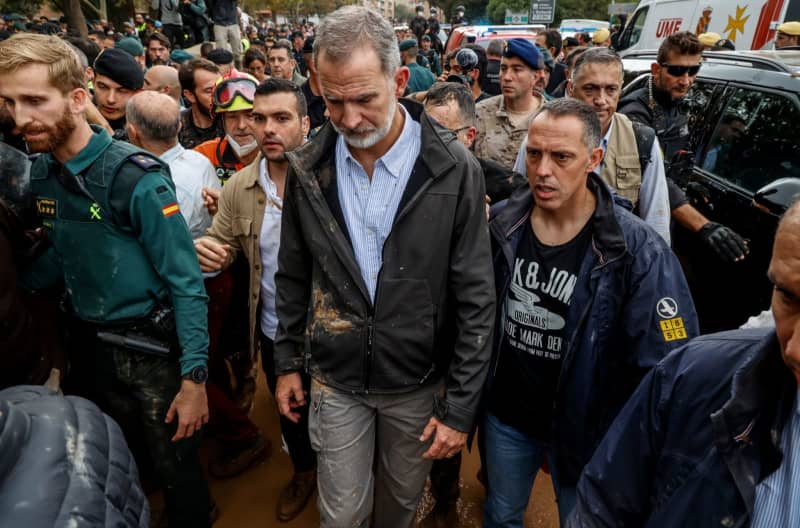On a recent visit to the Valencia region, which has been devastated by severe floods, Spain’s King Felipe VI, Queen Letizia, and Prime Minister Pedro Sánchez faced significant public hostility. The visit came in the wake of deadly storms that have wrought havoc across the east and south of the country, with the authorities reporting a death toll that has tragically escalated to 217, and many individuals still unaccounted for. These tragic events have led to rising tensions among the local populace, particularly in towns like Paiporta, where residents expressed their frustration and anger vocally, labeling the royal delegation as “murderers” and demanding their resignation. Some locals urged the officials to participate in the recovery efforts, illustrating a community deeply affected by feelings of abandonment in the wake of the disaster.
During their visit, the royal couple attempted to engage with the distressed community, as demonstrated by Queen Letizia conversing with a visibly shaken woman. This scene was broadcast live on state television, capturing the somber reality of the situation where mud was still clinging to the queen’s hands and face. King Felipe VI also took steps to comfort residents, even embracing younger individuals in an effort to offer solace amidst the chaos. The atmosphere grew increasingly charged, with the facade of a royal visit shrouded by layers of grief and despair as locals voiced their needs and frustrations directly to the visiting dignitaries. Following commotion and the initial throw of mud, security personnel faced challenges in maintaining order, ultimately leading to the cancellation of further scheduled public engagements due to mounting tensions.
The adversity faced by the communities in the Valencia region has been compounded by the slow response time in the days immediately following the emergency, wherein many towns experienced delays in receiving aid. Reports revealed images of cars and furniture strewn across muddy streets, with residents cut off from essential supplies like food, drinking water, and electricity. Many local mayors felt compelled to take action themselves, organizing initial relief efforts to support affected individuals and families in their communities. Volunteers from Valencia also stepped in to deliver vital supplies and support, walking to the hardest-hit areas with relief provisions amid the devastation.
As Spain continued to grapple with the effects of severe weather, an orange weather alert was issued for parts of the Valencia region, including Castellón, indicating the possibility of further rainfall and complicating recovery operations. By the sixth day following the disaster, recovery efforts were still hampered by conditions, particularly when searching through underground car parks or other flooded structures. Prime Minister Sánchez announced additional military and police support, stating that thousands of personnel were being deployed to aid the recovery efforts in the hardest-hit areas. Acknowledging the mounting criticism directed towards the government’s response, authorities have focused on facilitating relief to communities still in dire need of assistance.
The remarkable transformation of typically dry riverbeds into raging torrents during the floods further exacerbated the damage throughout the region. The aftermath of the storms has led to lasting devastation, with many areas still grappling with rubble and the need for comprehensive clean-up efforts. Recovery operations are particularly complex due to the massive volumes of debris that have blocked roads and severely impaired transport routes. Despite the government and volunteer support beginning to reach these areas, the emotional toll on residents remains profound, with many still facing daunting challenges as they begin to reconstruct their lives amidst the wreckage.
In conclusion, the visit of Spain’s royal couple to the Valencia region amid the disaster serves as a poignant reminder of the emotional and practical difficulties faced by communities during times of crisis. Their attempts to comfort and connect with the residents reveal the complexities of navigating public sentiment, especially when feelings of abandonment and frustration run high. While efforts are underway to restore normalcy and provide aid, the lasting effects of the floods underscore the critical importance of prompt and effective disaster response. The resilience of the affected communities, coupled with the support of local leaders and volunteers, signifies a collective effort to rebuild and recover from one of the worst natural disasters in recent memory for Spain.

